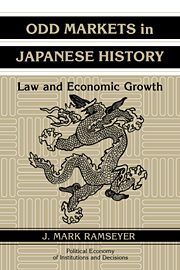Book contents
- Frontmatter
- Contents
- List of tables
- Series editors' preface
- Acknowledgments
- INTRODUCTION
- CHAPTER 1 LAW AND ECONOMIC GROWTH
- CHAPTER 2 PROPERTY: WATER AND LAND
- CHAPTER 3 EXTERNALITIES: SMOKE AND NOISE
- CHAPTER 4 MARKETS: CHILDREN
- CHAPTER 5 AUTONOMY: FAMILY LAW
- CHAPTER 6 PROMISSORY CREDIBILITY: SEX
- CHAPTER 7 CARTELS: COTTON SPINNING
- CHAPTER 8 CONCLUSIONS
- References
- Index
- POLITICAL ECONOMY OF INSTITUTIONS AND DECISIONS
CHAPTER 4 - MARKETS: CHILDREN
Published online by Cambridge University Press: 21 September 2009
- Frontmatter
- Contents
- List of tables
- Series editors' preface
- Acknowledgments
- INTRODUCTION
- CHAPTER 1 LAW AND ECONOMIC GROWTH
- CHAPTER 2 PROPERTY: WATER AND LAND
- CHAPTER 3 EXTERNALITIES: SMOKE AND NOISE
- CHAPTER 4 MARKETS: CHILDREN
- CHAPTER 5 AUTONOMY: FAMILY LAW
- CHAPTER 6 PROMISSORY CREDIBILITY: SEX
- CHAPTER 7 CARTELS: COTTON SPINNING
- CHAPTER 8 CONCLUSIONS
- References
- Index
- POLITICAL ECONOMY OF INSTITUTIONS AND DECISIONS
Summary
INTRODUCTION
As Thomas Hardy told it, Michael Henchard sold her in a tavern at a wayside fair. He was poor, drunk, unhappy, and unhappily married. He owned her. “I don't see why men who have got wives and don't want ‘em, shouldn't get rid of 'em as these gipsy fellows do their old horses,” he explained (Hardy, 1886). If a passing sailor wanted her, well for five guineas he could have her.
From time to time, scholars have told similar tales of Tokugawa (1600– 1868) Japan. The late Takeyoshi Kawashima (1950a,b), professor of civil law at the University of Tokyo and probably the best-known legal sociologist in Japan, claimed Tokugawa men routinely sold their wives and children or rented them long-term. It was endemic to the brutality of Asiatic patriarchal feudalism, he explained. During the early Tokugawa period “peasants frequently sold their family members into temporary servitude,” echoes historian Mikiso Hane (1972: 170–1). “In reality this resulted in permanent enslavement, because the contract could not be dissolved until the debt was repaid, and this the impoverished peasants could seldom do.…[Indentured servants [had] terms of service [that] might run from ten years to a lifetime.”
One might have thought the sold children would resist. According to most scholars, though, out of ideological conformity or cultural docility they eventually complied. Living as they did within a hierarchical and familistic world, they thought working in a place like a brothel for the sake of the family “a supreme example of filial self-sacrifice” (Hendry, 1986: 21).
- Type
- Chapter
- Information
- Odd Markets in Japanese HistoryLaw and Economic Growth, pp. 54 - 79Publisher: Cambridge University PressPrint publication year: 1996
- 1
- Cited by



